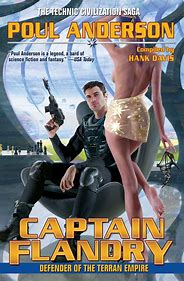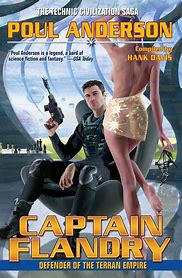The inhabited planet, Aruli, is mentioned only once in Poul Anderson's Technic Civilization History, in "Outpost of Empire." This story is set on the humanly colonized planet, Freehold. I am fairly certain that one of the four works set after the Fall of the Terran Empire refers to the importation of specially designed organisms from Freehold, although I do not have this reference to hand. This would mean that Freehold joins Atheia and Kraken as one of the colonized planets that provide a link and a degree of continuity between the periods of the Terran Empire and the Allied Planets.
Meanwhile, what does "Outpost of Empire" tell us concerning Aruli, which is not a colony but an independently inhabited planet?
The Arulians are thin, blue-feathered, sharp-snouted, seven-fingered bipeds. Lieutenant Muhammad Sadiq of the Terran Space Navy refers to the Arulian enemy as "'...the blues...'" (
Captain Flandry, Riverdale NY, 2010, p. 10). (The Terran Empire, ruling the entire Solar System and a vast volume of extra-solar space, of course incorporates all the territories of the former British Empire and Commonwealth.)
Arulians:
have three sexes and a breeding cycle;
do not own property but act mutually with their "pheromonesharers" (p. 12);
instinctively, are less combative individually but possibly more so collectively;
do not recognize Imperial fealty, instead living and dying under the Law of the Sacred Horde and finding "'...truth's wellspring in Eternal Aruli...'" (p. 12);
are ruled by the Bearers of the Horns, a position that has recently been seized by Merseian-sponsored revolutionaries.
Arulian mercantile associations, using Merseian technology, traded with Freehold and some Arulians settled there with an extraterritoriality agreement two centuries ago. But, when the Terran-Merseian relationship deteriorated, the Nine Cities of Freehold applied for and were granted membership of the Empire. Arulians on Freehold revolted and were found to have smuggled tons of war supplies and thousands of troops into wilderness areas beforehand. When John Ridenour interrogates an Arulian prisoner, their only common tongue is the main Merseian language, Eriau.
I think that that exhausts what we are told about Aruli but it is merely a prelude to the conflict between the Cities and the human forest dwellers. I have not got to grips with this latter conflict yet.





